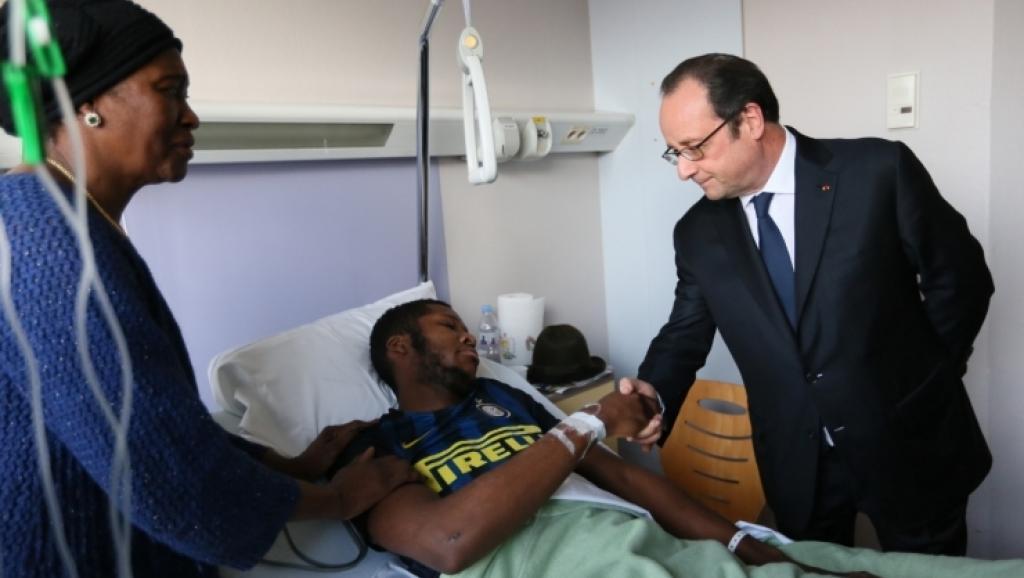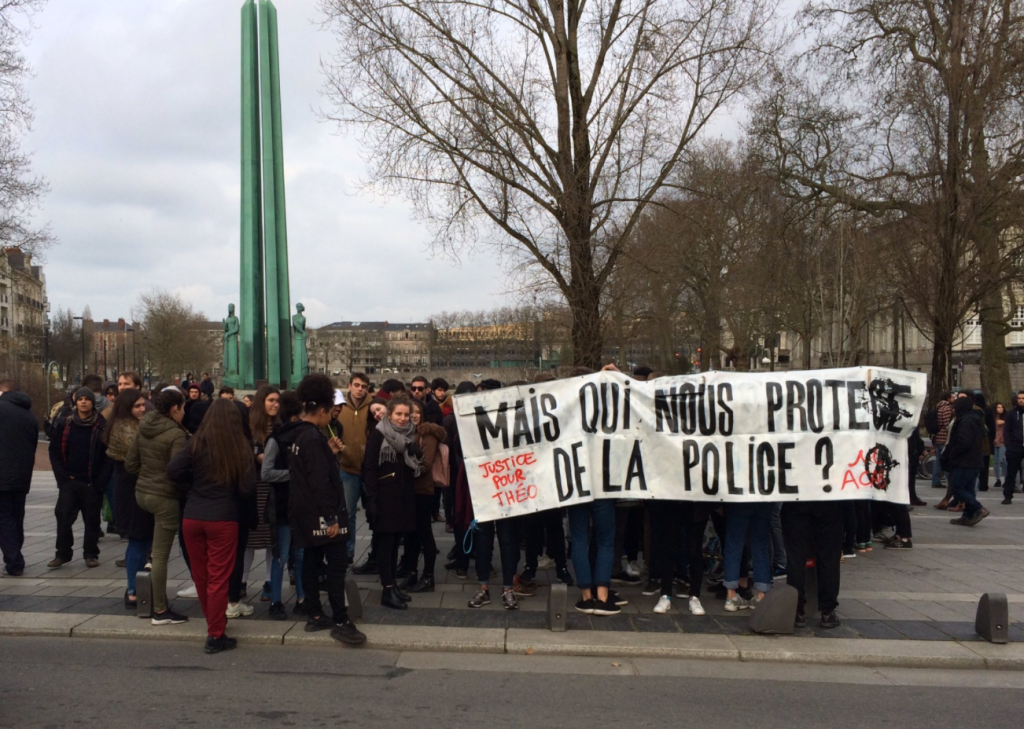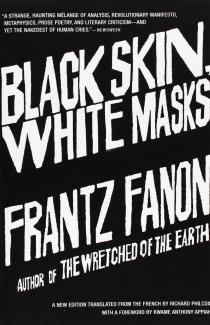Guilaine Kinouani
Theo and the distinctly sexual flavour of French racism
Content warning: contains detailed descriptions of sexual abuse
On 2 February, a 22-year-old black French man named Theo was allegedly violently raped with a police truncheon, gang assaulted and racially abused by four French police officers in the Parisian suburb of Aulnay-sous-Bois. So severe were the anal injuries sustained by Theo that he needed major surgery after the incident. As I write, Theo remains in a stable condition in hospital after having been visited by president Hollande. The incident occurred less than a year after the suspicious death of Adama Traore in police custody and, led to renewed accusations of police brutality and racism in France. Old wounds have been re-opened and the city is gripped with protests.

Francois Hollande visits Theo in hospital by L. Blevennec/Elysée Press Office
In a country that seems to have made the denial of racism a national sport, the police internal investigation naturally concluded that Theo’s injuries were the result of an accident. This should surprise no one. It was only a few years ago that Hollande, then candidate to the presidency, pledged to remove the word race from the French constitution so that we could, once and for all, get to grips with France’s post-racial era and presumably; live happily ever after. Currently contesting Hollande’s denial score, is the man who could well become France’s next president: Francois Fillon, who shamelessly described colonialism as France ‘sharing its culture’ last summer.
I could not bear to watch the video of Theo’s rape and abuse. The screenshots alone threaten to take my body back to France. Any person of colour whose body has navigated different geographic spaces knows that every ‘western’ place on earth gives racism a particular flavour, a distinct quality. Though, I am often reluctant to revisit it, there is something about the racism I have experienced in France that I struggle to convey in words. Even as a French woman of colour. Something extremely and often overly sexual.
The Predatory Peacekeepers campaign, which I started alongside Samantha Asumadu following accusations that UN and French troops in the Central African Republic (CAR) had sexually abused at least 98 girls, exposed similar intersecting issues of racism and sexual violence. The harrowing alleged abuses included African girls being tied up, urinated on and raped by multiple soldiers and, girls being forced to have sex with dogs. Once more, those distinctive themes of racialised sexualised degradation and perversion were laid bare. As we campaigned for justice, my body was forced to remember my life in France.

Protests in Nantes by @ClementGregory on Twitter
During the summer of 2016, I watched withtears in my eyes as armed policemen ordered a French Muslim woman on the beach to publically undress. Images of her symbolic rape and public degradation justified under the so-called ‘burkini ban’ forced me to again consider the hyper-sexual nature of France’s racism. Looking back, the country has a long history of sexualised imperialism. The removal of veils from North African women. The sexual torture of black and brown bodies. The naked exhibition of colonial subjects. Sexual degradation as entertainment and rape as assimilation…all these are echoed here. Darker chapters of France‘s history seem to be begging to be revisited and, they are necessary to grasp the phenomenology of the of racism a French woman inhabiting a black body would experience there today.
I can tell you about white men speaking in my ears or otherwise feeling entitled to invade my personal space all while expecting grateful submission. I want to mention my body being touched disturbingly frequently and quite casually and by complete strangers unburdened with seeking my consent. I want to tell you too, about becoming so conscious of my body when entering certain spaces it felt as though I was naked. And, I want you to know how it feels to be so consumed by a wholly sexualised and deeply denigrating gaze. These are painful embodied memories. Little cumulative acts of boundary violation. Micro acts of colonisation.

Black and brown bodies have long been used as sites for white expression of sadism and sexual perversion. France arguably leads the stake board on this front. The manner of Theo’s assault would have resulted in his penis being crushed onto the ground. The symbolism of a black man’s penis being crushed whilst he is raped is too significant to ignore. Many theorists, including Frantz Fanon, have suggested that racism and white sexual sadism onto black men’s bodies stems from inferior self-concepts concerning penis size, and fantasies around the socially constructed sexual potency of black men. The castration of black men and their structural ’emasculation’ have long been used as strategies to maintain the colonial order, to assert power, and to cope with the envy and fear of the ‘primal’ black penis. The same fantasised hyper-masculinity which so terrified slavers and colonisers, was what French police officers sought to disarm, to neutralise and to publicly reclaim from Theo.
‘Still on the genital level when the white man hates Black men is he not yielding to a feeling of impotence or of sexual impotency?’ Frantz Fanon, 1952
The rape of Theo is not only an act of violence and hatred towards inner-city youth in France, though this it clearly is. It is not only an act of toxic and contested masculinity, even if toxic masculinity is most certainly at play here. It is not solely about social and psychological control, although I hope no one doubts, it is that too. The rape of Theo is a sexualised act of colonial submission too. More than that, it evidences that ghost of colonialism continues to rear its ugly head amidst collective repression and denialism. Failing to acknowledge this simply reproduces France’s willful amnesia regarding its sexualised colonial history and its violence. A violence that nonetheless continues to resurface with the regularity of clockwork as do most things we try to repress which require attention.
Guilaine is a French woman of African descent, an amateur writer, an independent trainer and a race, culture and equality consultant currently working toward a Doctorate in Clinical Psychology and accreditation as an integrative psychotherapist. Before this, she completed a degree in Cultural Studies and studied Counseling Psychology after obtaining a Masters in Transcultural Mental Health. She blogs at racereflections on the interface of psychology, mental health, social justice, inequalities and difference. Tweet her @KGuilaine
